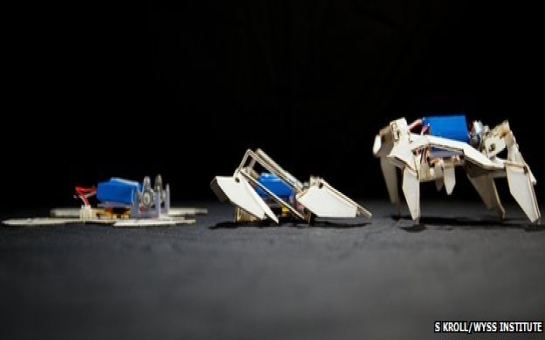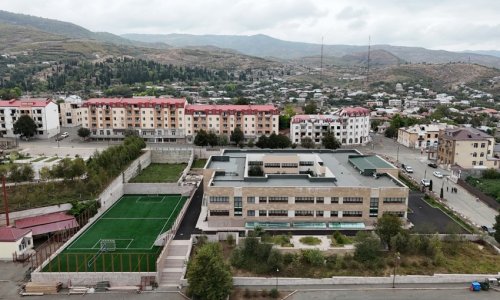The robots are inspired by the ancient Japanese art of origami.They are made from flat layers of material; some of these are rigid and hold their shape, while others are made of a heat-shrinking polymer.Embedded elements within these layers provide heat, allowing the robot to self-construct.The advance is reported in the journal Science.The Harvard team say this origami-inspired engineering could allow people to make complex objects and devices much more cheaply and easily."I'm sure people have seen in examples of origami - you can use folding to create fantastically complex structures," said Harvard professor Robert Wood, who led the research."But once the complexity of these things exceeds a threshold, folding them by hand becomes painstaking."So he and his team, including collaborators at the Massachusetts Institute of Technology, wanted to demonstrate the power of folding by designing a complex machine that could fold itself.The team created a flat-layered design, including self-folding hinges that were controlled by embedded heating elements."We [incorporated] motors and batteries while it was flat," explained Prof Wood. These powered the final robot's walking motion.Prof Wood, who is also part of Harvard's Wyss Institute for biologically inspired design said there were a huge number of applications for devices that self-fold."Imagine self-deploying structures - maybe shelters or structures for space exploration or for satellites," he told BBC News."Things where the logistics are difficult, like humanitarian aid in war zones."He said the team also wanted to inspire a "maker mentality" and give people more tools to build complex devices."It's a similar theme to 3-D printing," he said."We're trying to provide tools for people - whether they're engineers or not - to build complex structures for whatever they want."UK-based aerial robotic expert Dr Mirko Kovac from Imperial College said the work was an excellent example of robotics research that had the potential to improve our lives."The principle of folding self-assembly is a step changing approach to robot design," he told BBC News."It allows non-experts to build mobile robots quickly and at very low cost."In future, such robots could even be made of biodegradable materials and be deployed in swarms to monitor and protect vulnerable ecosystems."(BBC)Bakudaily.Az
Robots inspired by origami fold themselves into motion
Culture
21:46 | 08.08.2014

Robots inspired by origami fold themselves into motion
Researchers in the US have developed self-folding robots that are able to take shape and crawl without human intervention.
Follow us !










